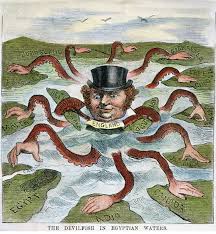记忆方法
为了记忆“imperialism”这个单词,可以将它分解为“im”和“perialism”。记住“im”部分可以联想到“impossible”的不可能,强调某种强大力量或影响。然后想象这个“impossible”的力量在控制着“perial”地区,即帝国般的扩张和控制,从而联想到帝国主义的概念。所以,可以记忆为:“impossible power controlling empires”。
以上内容由AI生成, 仅供参考和借鉴
中文词源
imperialism 帝国主义
词源同empire,帝国,帝权。
英语词源
- imperialism (n.)
- 1826, "advocacy of empire," originally in a Napoleonic context, also of Rome and of British foreign policy, from imperial + -ism. At times in British usage (and briefly in U.S.) with a neutral or positive sense relating to national interests or the spread of the benefits of Western civilization, but from the begining usually more or less a term of reproach. General sense of "one country's rule over another," first recorded 1878. Picked up disparagingly in Communist jargon by 1918.
It is the old story of 1798, when French republicanism sick of its own folly and misdeeds, became metamorphosed into imperialism, and consoled itself for its incapacity to found domestic freedom by putting an iron yoke upon Europe, and covering it with blood and battle-fields. [Francis Lloyd, "St. James's Magazine," January 1842]
权威例句
- 1. the yoke of imperialism
- 帝国主义的枷锁
- 2. Might is right -- that is the logic of imperialism.
- 强权即公理 -- 这是帝国主义的逻辑.
- 3. Plunder is the very nature of imperialism.
- 帝国主义的本性就是掠夺.
- 4. They held the imperialism in contempt.
- 他们鄙视帝国主义.
- 5. Imperialism has not been able to subjugate China.
- 帝国主义不能征服中国.
